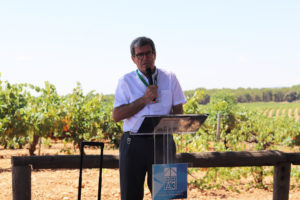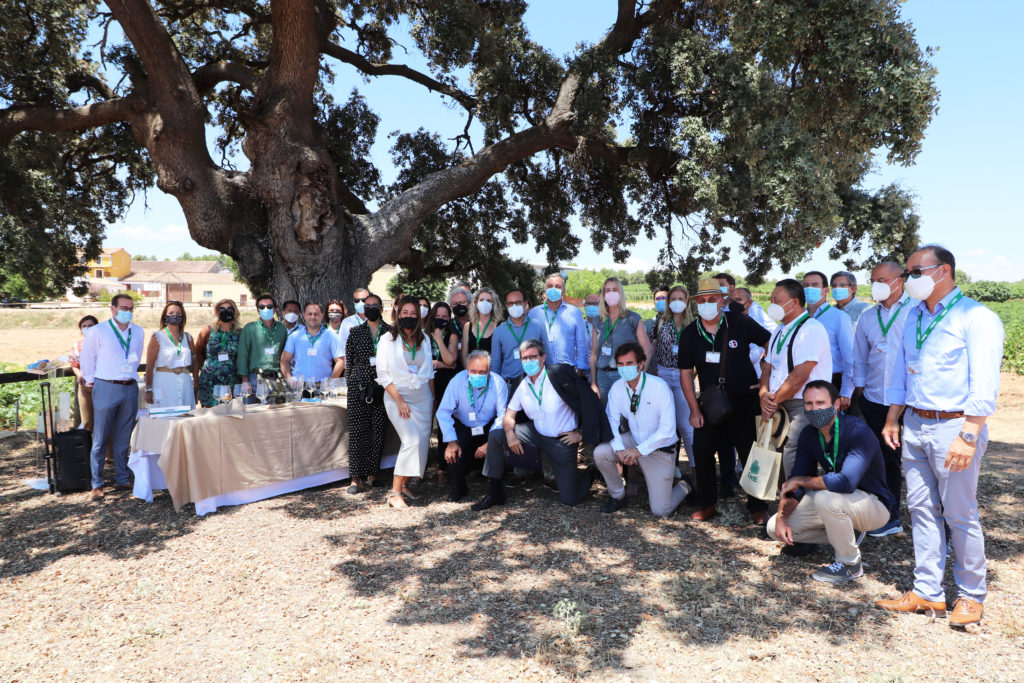
Aurelio Martínez inaugurates the cycle of networking meals of the Asociación Empresarial Polígonos Riba-roja A-3 (Rib A3) at Bodegas Nodus
Companies and port authority agree to look for an alternative to road traffic for the logistics sector and have agreed on future meetings
Valencia July 28th of 2021.- The Asociación Empresarial Polígonos Riba-roja A-3 (Rib A3) has celebrated this Tuesday the first session of its networking meals initiative to which relevant people from the economic and political sector of the Valencian Community will be invited so that they can talk with the companies of one of the most important industrial and logistic areas of Spain.
At the first meeting, held at Bodegas Nodus (Caudete de las Fuentes), the guest speaker was the president of the Port Authority of Valencia, Aurelio Martínez, who explained one by one the projects, lines of action and current problems of the Port of Valencia in almost an hour of speech to the more than 40 attendees.

Among these objectives, intermodality and the commitment to rail as a method of transport to avoid the collapse of roads, especially the V-30, and drastically reduce CO2 emissions were points on which converged with the feelings of the business community of Riba-roja. In fact, the possibility of creating a container stop in this logistics area to create a rail shuttle service directly to the Port of Valencia was put on the table.
A project that would have many advantages in terms of operability and reduction of CO2 emissions, in addition to increasing safety and automation of deliveries, loading and unloading. There would be thousands of containers that are sent every day from Riba-roja to the Port in trucks that would start arriving by rail: a safer, cleaner and faster transport.
However, projects of this type require, firstly, political will and, secondly, a significant amount of land to build the necessary infrastructure at the point of origin. A possibility that, according to Aurelio Martínez, has been considered to take advantage, precisely, of an old train track that connected with Cuenca and that could be reused for this transport. Both the companies and Rib A3 put themselves at the disposal of the Port to support this or other similar projects with the same objectives: improvement of efficiency and reduction of environmental impact.
From Rib A3, its manager, Romina Moya, stressed the will of the association to contribute to the entrepreneurs have a meeting place to make common force in the claim of projects of this type. An association that includes large, consolidated companies such as Raminatrans, led by Rafael Milla, and other newly created companies such as LoGy Logistics Solutions, owned by Javier Navarro Fayos.
Both businessmen agreed in thanking Aurelio Martinez for attending the event and for his sincerity in raising the problems of maritime traffic and the real state of possible solutions. In that sense, Rafael Milla insisted on the importance of a united business sector that goes hand in hand with entities such as the Port to ask the institutions for the necessary improvements so that Valencian companies can remain competitive and create wealth and employment.
For his part, Javier Navarro, who is making his debut with the company LoGy, highlighted the added value that the presence of Aurelio Martinez gave to a networking event for companies such as this one organized by Rib A3.
International collapse and expansion needs
Martinez made an extensive review of the maritime transport situation deeply marked by the crisis experienced in recent months because of the irruption of COVID-19. He explained that the increase in the demand for products by the USA due to its government’s consumption incentive policies has led to an increase in imports to North America, causing a collapse of ships that is affecting international maritime traffic. The demand is increasing and so are the containers, but the infrastructures are the same. This means that the ships must wait up to three weeks to unload and the companies must revert these costs in the price of the freights that have risen notably in the last months.
Stabilization will not arrive until the end of 2022, according to the Port Authority president, who has acknowledged that the situation has caused a collapse in the logistics chain.
Faced with this new scenario, he reiterated the need to expand the infrastructure of ports such as Valencia with the forecast that the future of maritime transport passes through “a few powerful port hubs” among which Valencia wants to be placed. Hence the need to be able to carry out projects such as the terminals of the northern expansion, the implementation of the ZAL (27 years stopped) or a northern access to the port that avoids the current agglomeration of trucks by the V-21 and V-30.
Projects that are on the table and well advanced but are encountering opposition based on mainly environmental issues. However, the president of the port stressed that, precisely, these improvements will help reduce the carbon footprint of maritime transport. In fact, he stressed that one of the fundamental lines of the Port of Valencia’s strategy for the coming years is sustainability and innovation with an agenda 2030 that aims to achieve port facilities that generate all the energy they consume thanks to the installation of solar panels and a wind farm.
Efficiency, with a firm commitment to digitalization, or the improvement of port-city integration are other strategic lines of the project led by Aurelio Martínez.

